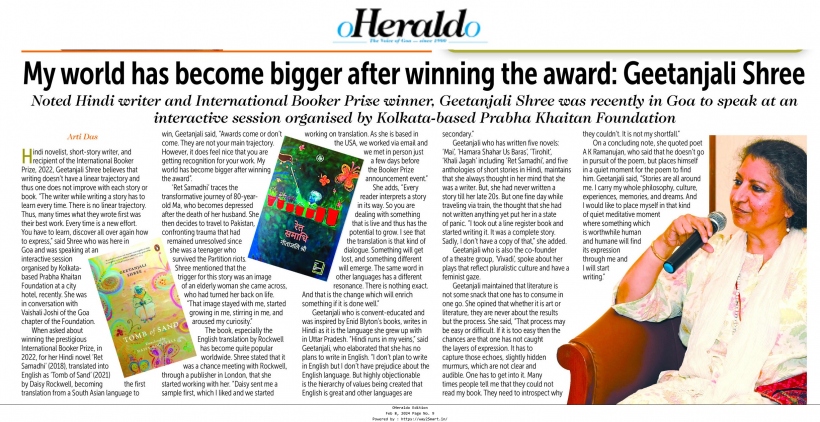08 Feb 2024 | 05:17am IST
My world has become bigger after winning the award: Geetanjali Shree
Noted Hindi writer and International Booker Prize winner, Geetanjali Shree was recently in Goa to speak at an interactive session organised by Kolkata-based Prabha Khaitan Foundation
Arti Das
H
indi
novelist, short-story writer, and recipient of the International Booker Prize,
2022, Geetanjali Shree believes that writing doesn’t have a linear trajectory
and thus one does not improve with each story or book. “The writer while
writing a story has to learn every time. There is no linear trajectory. Thus,
many times what they wrote first was their best work. Every time is a new
effort. You have to learn, discover all over again how to express,” said Shree
who was here in Goa and was speaking at an interactive session organised by
Kolkata-based Prabha Khaitan Foundation at a city hotel, recently. She was in
conversation with Vaishali Joshi of the Goa chapter of the Foundation.
When
asked about winning the prestigious International Booker Prize, in 2022, for
her Hindi novel ‘Ret Samadhi’ (2018), translated into English as ‘Tomb of Sand’
(2021) by Daisy Rockwell, becoming the first translation from a South Asian
language to win, Geetanjali said, “Awards come or don’t come. They are not your
main trajectory. However, it does feel nice that you are getting recognition
for your work. My world has become bigger after winning the award”.
‘Ret
Samadhi’ traces the transformative journey of 80-year-old Ma, who becomes
depressed after the death of her husband. She then decides to travel to
Pakistan, confronting trauma that had remained unresolved since she was a
teenager who survived the Partition riots. Shree mentioned that the trigger for
this story was an image of an elderly woman she came across, who had turned her
back on life. “That image stayed with me, started growing in me, stirring in
me, and aroused my curiosity.”
The
book, especially the English translation by Rockwell has become quite popular
worldwide. Shree stated that it was a chance meeting with Rockwell, through a
publisher in London, that she started working with her. “Daisy sent me a sample
first, which I liked and we started working on translation. As she is based in
the USA, we worked via email and we met in person just a few days before the
Booker Prize announcement event.”
She
adds, “Every reader interprets a story in its way. So you are dealing with
something that is live and thus has the potential to grow. I see that the
translation is that kind of dialogue. Something will get lost, and something
different will emerge. The same word in other languages has a different
resonance. There is nothing exact. And that is the change which will enrich
something if it is done well.”
Geetanjali
who is convent-educated and was inspired by Enid Blyton’s books, writes in
Hindi as it is the language she grew up with in Uttar Pradesh. “Hindi runs in
my veins,” said Geetanjali, who elaborated that she has no plans to write in
English. “I don’t plan to write in English but I don’t have prejudice about the
English language. But highly objectionable is the hierarchy of values being
created that English is great and other languages are secondary.”
Geetanjali
who has written five novels: ‘Mai’, ‘Hamara Shahar Us Baras’, ‘Tirohit’, ‘Khali
Jagah’ including ‘Ret Samadhi’, and five anthologies of short stories in Hindi,
maintains that she always thought in her mind that she was a writer. But, she
had never written a story till her late 20s. But one fine day while traveling
via train, the thought that she had not written anything yet put her in a state
of panic. “I took out a line register book and started writing it. It was a
complete story. Sadly, I don’t have a copy of that,” she added.
Geetanjali
who is also the co-founder of a theatre group, ‘Vivadi’, spoke about her plays
that reflect pluralistic culture and have a feminist gaze.
Geetanjali
maintained that literature is not some snack that one has to consume in one go.
She opined that whether it is art or literature, they are never about the
results but the process. She said, “That process may be easy or difficult. If
it is too easy then the chances are that one has not caught the layers of
expression. It has to capture those echoes, slightly hidden murmurs, which are
not clear and audible. One has to get into it. Many times people tell me that
they could not read my book. They need to introspect why they couldn't. It is
not my shortfall.”
On
a concluding note, she quoted poet A K Ramanujan, who said that he doesn’t go
in pursuit of the poem, but places himself in a quiet moment for the poem to
find him. Geetanjali said, “Stories are all around me. I carry my whole
philosophy, culture, experiences, memories, and dreams. And I would like to
place myself in that kind of quiet meditative moment where something which is
worthwhile human and humane will find its expression through me and I will
start writing.”

